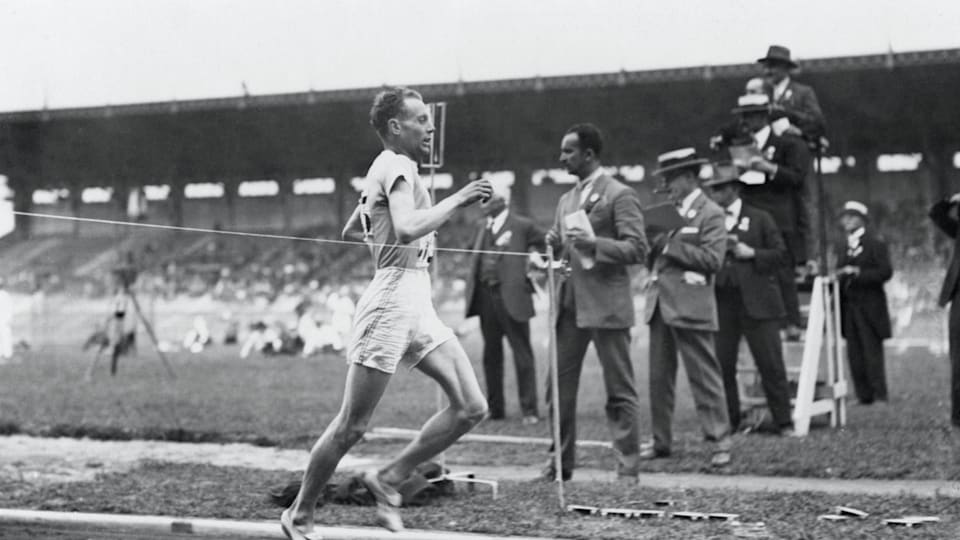Paavo Nurmi: A distance running legend who set two Olympic records in as many hours
The Olympic Games are full of champions, records and stories, but they’re also an incredible encyclopaedia of strange, funny, emotional and sad moments. We’ll dig some out every week to put a smile on your face or a tear in your eye. This week: Paavo Nurmi - the "Flying Finn" who set two Olympic records in two hours.

The background
Even before the Olympic Games Paris 1924, Finland’s Paavo Nurmi was considered one the greatest distance runners of all time. Four years beforehand at the Antwerp Games, Nurmi had achieved a breathtaking treble by winning gold in the 10,000m, cross-country race and team cross-country events. But the Antwerp 1920 Olympics were also notable for another remarkable fact: the silver medal he won in the 5,000m - where he was beaten by France’s Joseph Guillemot - the only time he ever lost an Olympic final to a foreign runner.
And there were plenty of finals to come.
By the end of 1923 - just a year before the Paris Olympic Games - Nurmi was in the enviable position of holding three track world records, for the mile, 5,000m and 10,000m.
It is a feat that hadn’t been achieved before, and has never been achieved since.
So it was fair to say that heading into the Games, Nurmi was a firm favourite for gold. But, for reasons outside of his control, Paris 1924 would prove anything but plain sailing for the high-flying Finn.
The finals
Nurmi arrived in Paris that fateful year with an unprecedented plan.
“Six months beforehand, I had decided to take part in all the Olympic races between 1,500 and 10,000,” the Finnish athlete explained in an interview recounted in the official history book of the Olympics.
However, concerned that their star athlete would suffer from burnout or exhaustion, the Finnish team leaders convinced Nurmi to drop plans to compete in the 10,000m. Even without that race to worry about, Nurmi was still enrolled in a dizzying five events; the 1,500m, 5,000m, cross-country individual races, 3,000m and cross-country team events.
But, perhaps the biggest of Nurmi’s challenges that year came from the competition organisers themselves: the 1,500m and 5,000m finals had been scheduled for the very same day, less than two hours apart.
On 10 July, in sweltering heat, Nurmi set out on his unprecedented quest to win two Olympic golds on the same day. In the first 800m of the 1,500m final, he was running three seconds faster than his own world record. He cruised to victory after his nearest rival surrendered his challenge at the end of the penultimate lap.
Incredibly, he had broken the Olympic record by over three seconds.
Less than two hours later, Nurmi faced an even greater challenge. Not only were there under 120 minutes between his 1,500m victory and a daunting 5,000m final, he was also facing perhaps the only person capable of challenging him for victory - his compatriot Ville Ritola, who had himself already triumphed in the 3,000m steeplechase and the 10,000m.
Hoping to intimidate him into submission, Ritola began the 5,000m final at world record pace, but Nurmi rose to the challenge, catching the race-leader before securing gold in yet another Olympic record time.
In the end, the race had seemed like a cakewalk to spectators in the stands, with the Guardian going as far as to describe the victory as “without apparent exertion”.
The outcome
Nurmi’s history-making antics at Paris 1924 were not over yet.
Saturday’s cross-country race saw him line up against 42 competitors in excruciating heat. Only 12 athletes finished the hilly 10,000m race with the rest being “picked up unconscious all along the course.” One of the French athletes who did make it to the stadium became so disoriented that he ran straight into the stands, knocking himself unconscious in the process.
But Nurmi faced no such difficulties. He ran home the victor, over 90 seconds ahead of his nearest rival, before winning yet another gold in another Olympic record in Sunday’s 3,000m team race.
At Amsterdam 1928, Nurmi finally got his wish to run again in the 10,000m. Once again he won gold, beating his countryman Ritola’s Olympic record - set in the race he was not allowed to compete in four years before - by over six seconds.
But this victory would prove to be the last for the incredible “Flying Finn".
In the 5,000m he was beaten to silver by his rival Ritola and in the 3,000m steeplechase, he again managed only second place - this time behind compatriot Toivo Loukola.
Following the 1928 Olympics, Nurmi made plans to take on the marathon event at the Olympic Games Los Angeles 1932. But before he got the chance to add another chapter to his legend, the Finn was banned from competing after being accused of being a professional athlete by the Swedish Olympic Committee.
It proved to be the end of an unforgettable Olympic journey for the record-breaking Finn who did the seemingly impossible with consummate ease.
